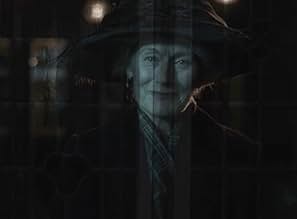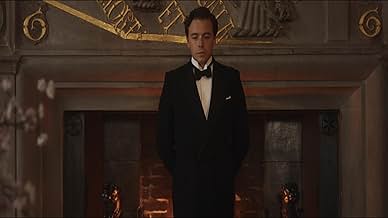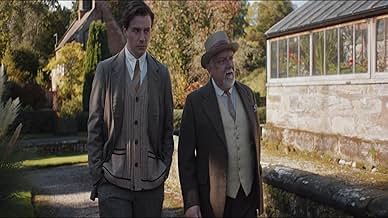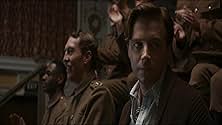ÉVALUATION IMDb
6,6/10
4,2 k
MA NOTE
L'histoire de la vie du poète, écrivain et soldat anglais Siegfried Sassoon.L'histoire de la vie du poète, écrivain et soldat anglais Siegfried Sassoon.L'histoire de la vie du poète, écrivain et soldat anglais Siegfried Sassoon.
- Prix
- 9 victoires et 19 nominations au total
Avis en vedette
Davies is a masterful filmmaker. He has stated that he is not a "Gay" filmmaker in the way that, possibly, Jarman was. I think this is generally true. Davies seems more concerned with individual struggle and self-expression than homosexual rights. His period films recall a time when individuals created and asserted their identity in opposition to social conformity. While he emphasizes the personal and the private sphere of experience, he also recognizes how these can transform society. A Quiet Passion, Sunset Song, and Benediction are about people revolting in very unique ways. The performances and control of other elements are subtle, complex, and always interesting.
Benediction.
This long film is possibly better suited for TV viewing, so for UK viewers I expect to see it on BBC TV because BBC-Films was one of the funding sources. Despite that, I'm pleased to have seen it at the almost empty cinema if only for the better focus there with no distractions of home.
I liked this more than I was expecting, which possibly says more about me than the film.
It's a surprise to me that this film got made, especially in these pandemic times, as it is quite indulgent, languid and would appeal to a possibly limited segment of cinema goers.
It is not a biography of Sassoon, as there's no mention of his father, his father's early death, the bequest from his aunt, or Heytesbury, or his death etc.
Instead it is an absorbing slightly mesmeric collage of catty dialogue, music, poetry and grainy WW1 footage and still photography artfully assembled into a tale of searching for redemption and the angst for help to deal with the past, which presumably explains the title.
The initial early transition between actors (young Siegfried and old Siegfried) could have been better handled as at least one later transition of another character was clearly done. Peter Capaldi is fabulously haunted in the role of old Siegfried, though with a clipped accent to mask the rich Scottish tones underneath. The always watchable Geraldine James appears briefly as mother.
Jeremy Irvine is devilish as Ivor Novello. Calam Lynch is acidic as young Stephen Tennant. Jack Lowden is reasonable as young Siegfried.
The first of the song choices seemed anachronistic, as the backing for grainy WW-1 footage. But this is a minor detail.
Overall: best for TV maybe, 7/10.
This long film is possibly better suited for TV viewing, so for UK viewers I expect to see it on BBC TV because BBC-Films was one of the funding sources. Despite that, I'm pleased to have seen it at the almost empty cinema if only for the better focus there with no distractions of home.
I liked this more than I was expecting, which possibly says more about me than the film.
It's a surprise to me that this film got made, especially in these pandemic times, as it is quite indulgent, languid and would appeal to a possibly limited segment of cinema goers.
It is not a biography of Sassoon, as there's no mention of his father, his father's early death, the bequest from his aunt, or Heytesbury, or his death etc.
Instead it is an absorbing slightly mesmeric collage of catty dialogue, music, poetry and grainy WW1 footage and still photography artfully assembled into a tale of searching for redemption and the angst for help to deal with the past, which presumably explains the title.
The initial early transition between actors (young Siegfried and old Siegfried) could have been better handled as at least one later transition of another character was clearly done. Peter Capaldi is fabulously haunted in the role of old Siegfried, though with a clipped accent to mask the rich Scottish tones underneath. The always watchable Geraldine James appears briefly as mother.
Jeremy Irvine is devilish as Ivor Novello. Calam Lynch is acidic as young Stephen Tennant. Jack Lowden is reasonable as young Siegfried.
The first of the song choices seemed anachronistic, as the backing for grainy WW-1 footage. But this is a minor detail.
Overall: best for TV maybe, 7/10.
"Many live for the moment, you live for the eternity" British poet Siegfried Sassoon's son to his father in his final days--as the poet continues to bemoan the dead soldiers of of WWI who died for a cause that had changed from what it was when they enlisted. Thanks to Terrence Davies' film I have come to appreciate Sassoon's poetry. As a film, I prefer the comparable film "Under Milkwood" on the life and poetry of Dylan Thomas. A trivial highlight of the film: T E Lawrence (a.k.a. Lawrence of Arabia) attending the very private wedding of Sassoon! Though mentioned briefly as an admirer of the poet Sassoon, Noel Coward never gets shown in the film. Some aspects of the screenplay are very impressive, while some are not (switching back and forth in time, needlessly, those relating to one of Sassoon's many gay paramours).
My initial reaction was, "unfocused and messy," but someone else called it a collage, and I think that is a more accurate description of the film.
It's not a biography, it's not really about war, or love, or living a closeted life during a specific period in UK history; it's not about aging; it's not about poetry, or trauma. The title suggests it might be about guidance, blessing, or redemption, but in regard to what, I can't really say.
It's also about all of those things, depending on the minute. The movie changes focus quite a few times, and I found that incredibly frustrating. After two and a half hours, I did not leave with any firmed-up impression of Sassoon, or the basic intention of the film.
Having said that, the lead actor and the rest are all perfectly enjoyable to watch, the dialogue is organic, and aside from spliced-in war footage, it is pleasing to the eye. It's a good choice for watching on demand or otherwise at home. But it's not a movie that lingers.
It's not a biography, it's not really about war, or love, or living a closeted life during a specific period in UK history; it's not about aging; it's not about poetry, or trauma. The title suggests it might be about guidance, blessing, or redemption, but in regard to what, I can't really say.
It's also about all of those things, depending on the minute. The movie changes focus quite a few times, and I found that incredibly frustrating. After two and a half hours, I did not leave with any firmed-up impression of Sassoon, or the basic intention of the film.
Having said that, the lead actor and the rest are all perfectly enjoyable to watch, the dialogue is organic, and aside from spliced-in war footage, it is pleasing to the eye. It's a good choice for watching on demand or otherwise at home. But it's not a movie that lingers.
Brownie points to Netflix for sponsoring this movie, which must have only limited appeal even to older gay viewers. Jack Lowden stars as World War One poet Siegfried Sassoon (Jack Lowden), whose emotional and sexual life director Terence Davies explores in this gloomy biopic. After publishing a letter condemning the military chiefs for the appalling death toll the conflict has brought, Sassoon is lucky not to be shot as a traitor; they send him to a mental institution where he meets and falls in love with fellow poet Wilfred Owen who's suffering from shell-shock (as PTSD was called in those dark days). Owen is sent back to die in Picardy in the last week of the war. The screenplay skates past Sassoon's brief return to active service.
After the war Siegfried has a brief affair with Ivor Novello (Jeremy Irvine), shown here as the uber-bitch in London's far-from-discreet gay set. Siegfried has a longer but equally unhappy affair with upper-crust socialite Stephen Tennant (Calam Lynch), the model for Sebastian Flyte in Evelyn Waugh's BRIDESHEAD REVISITED. Unhappy with homosexual life and converting to Catholicism, Sassoon marries. Flash-forward to his later life shows Sassoon (now played by Peter Capaldi) at odds with his wife and their son.
Throughout the movie Davies inserts horrific glimpses of battle casualties which never cease to haunt Sassoon. His poems are voice-overed from time to time, although two poems of Owen's make it clear that Sassoon was somewhat Second Division in comparison.
This is a beautifully shot movie, and all the cast perfectly evoke the look and feel of the 1920s and 30s, but the scriptwriter's prevailing tone is depressing. Male lovers and a wife all fail to bring happiness to Siegfried Sassoon. A life unfulfilled; a glum movie.
After the war Siegfried has a brief affair with Ivor Novello (Jeremy Irvine), shown here as the uber-bitch in London's far-from-discreet gay set. Siegfried has a longer but equally unhappy affair with upper-crust socialite Stephen Tennant (Calam Lynch), the model for Sebastian Flyte in Evelyn Waugh's BRIDESHEAD REVISITED. Unhappy with homosexual life and converting to Catholicism, Sassoon marries. Flash-forward to his later life shows Sassoon (now played by Peter Capaldi) at odds with his wife and their son.
Throughout the movie Davies inserts horrific glimpses of battle casualties which never cease to haunt Sassoon. His poems are voice-overed from time to time, although two poems of Owen's make it clear that Sassoon was somewhat Second Division in comparison.
This is a beautifully shot movie, and all the cast perfectly evoke the look and feel of the 1920s and 30s, but the scriptwriter's prevailing tone is depressing. Male lovers and a wife all fail to bring happiness to Siegfried Sassoon. A life unfulfilled; a glum movie.
Le saviez-vous
- AnecdotesSeven of Siegfried Sassoon's poems were narrated in the film: Concert Interpretation, Died of Wounds, When I'm among a Blaze of Lights, To my Mother, To my Brother, Attack, and Invocation.
- GaffesSassoon did not discard his M.C. medal as shown in this film. He tossed away the medal's corresponding ribbon. The medal itself was inherited by Sassoon's son George.
- Citations
Dr. Rivers: Why not?
Siegfried Sassoon: Too afraid, too inhibited. Shamed by an inner corruption. Or perhaps it's simply because of... What's the phrase? "The love that dare not speak its name."
Dr. Rivers: You are not alone in that respect.
Meilleurs choix
Connectez-vous pour évaluer et surveiller les recommandations personnalisées
- How long is Benediction?Propulsé par Alexa
Détails
- Date de sortie
- Pays d’origine
- Sites officiels
- Langues
- Aussi connu sous le nom de
- 베네딕션
- Lieux de tournage
- Chillington Hall, Port Lane, Brewood, Wolverhampton WV8 1RE, United Kingdom(Interiors and outdoor scenes)
- sociétés de production
- Consultez plus de crédits d'entreprise sur IMDbPro
Box-office
- Brut – États-Unis et Canada
- 201 093 $ US
- Fin de semaine d'ouverture – États-Unis et Canada
- 50 970 $ US
- 5 juin 2022
- Brut – à l'échelle mondiale
- 847 418 $ US
Contribuer à cette page
Suggérer une modification ou ajouter du contenu manquant


































